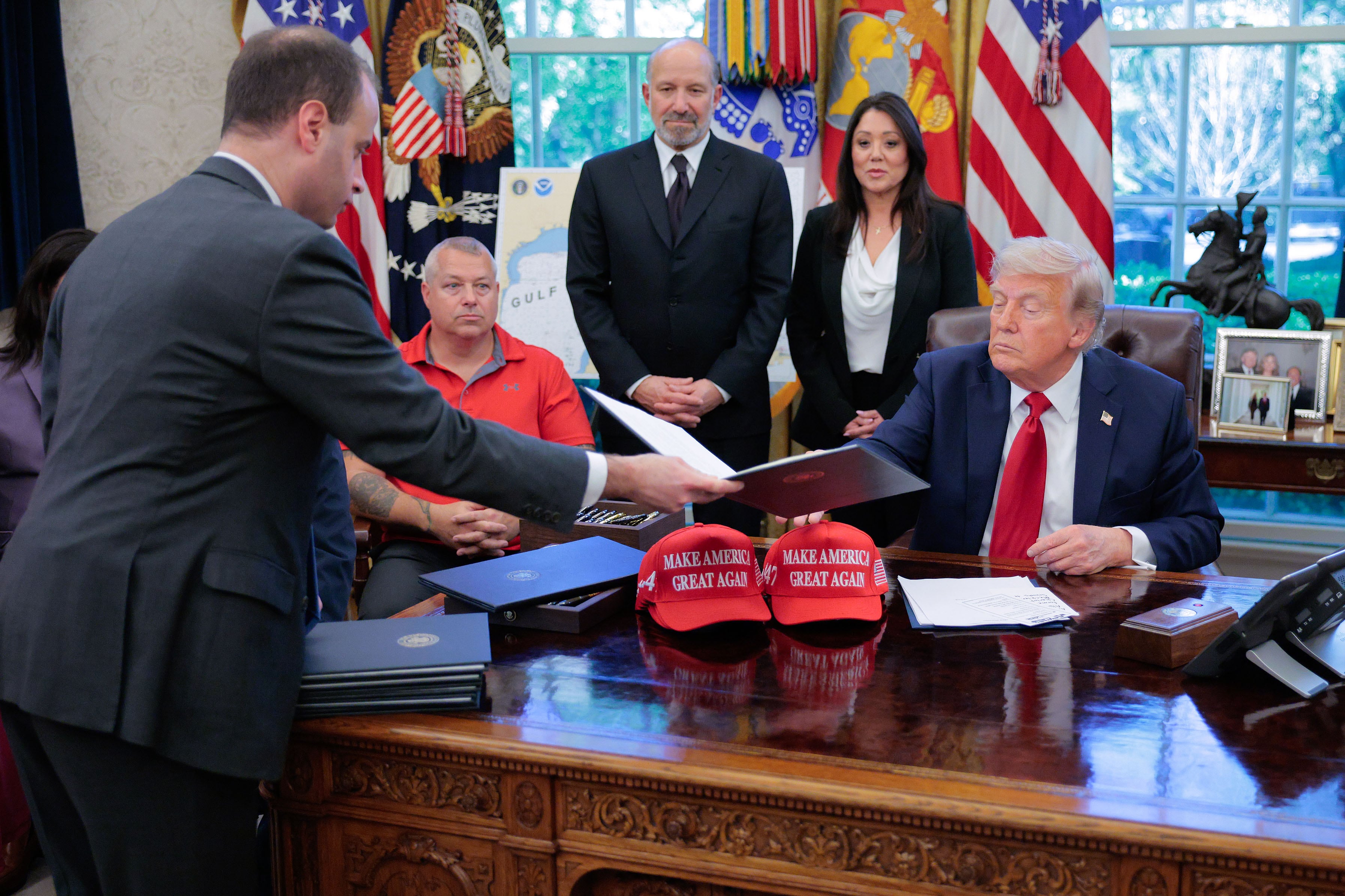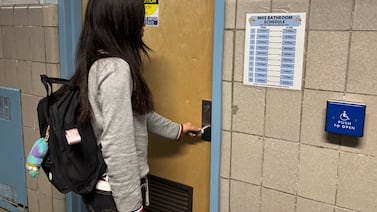Sign up for Chalkbeat’s free weekly newsletter to keep up with how education is changing across the U.S.
President Donald Trump signed executive orders Wednesday that aim to promote stricter school discipline and discourage schools from considering whether discipline policies have a greater impact on students of color.
The executive orders target civil rights guidance from the Obama administration that Trump revoked during his first administration and Biden never formally restored. Some school leaders, teachers, and conservative education advocates blamed the Obama-era guidance for deteriorating safety conditions in schools, alleging that administrators let bad behavior slide rather than risk additional scrutiny.
The most recent federal data, from the 2021-22 school year, shows students report fewer assaults and less harassment and bullying than they did a decade ago. Still, a rise in school shootings along with viral videos of vicious assaults have fueled fears about school safety. Two-thirds of schools reported at least one violent incident on campus in the 2021-22 school year.
Under former President Barack Obama, the Education Department warned schools that policies that led to students of certain racial groups being suspended or expelled at much higher rates could be discriminatory. In particular, Black students tend to be suspended at higher rates than other students.
This approach to civil rights enforcement is an example of disparate impact analysis, which considers whether ostensibly race-neutral policies affect certain racial or ethnic groups differently.
The executive orders ban the use of disparate impact analysis in civil rights enforcement and threaten schools with consequences if they use “racial discrimination and preferencing” in school discipline.
They were two of seven education-related executive orders that Trump signed Wednesday afternoon. Other orders encourage schools to train students to use artificial intelligence, pledge to expand apprenticeships, promote historically Black colleges and universities, and target the university accreditation process.
During the ceremony, Trump said the school discipline executive order was especially important to Education Secretary Linda McMahon and handed her the signed copy to hold.
“Under the Biden-Harris Administration, schools were forced to consider equity and inclusion when imposing discipline,” McMahon said in a statement. “Their policies placed racial equity quotas over student safety — encouraging schools to turn a blind eye to poor or violent behavior in the name of inclusion.”
“Disciplinary decisions,” she wrote, “should be based solely on students’ behavior and actions.”
The school discipline order requires federal officials to issue new guidance to state education agencies and school districts. It also calls for federal officials to author a report analyzing “DEI-based school discipline and its consequences” with strategies for how the federal government can ensure its dollars do not support “racially preferential policies” such as model school discipline policies.
The report should include information about the status of “discriminatory-equity-ideology-based school discipline and behavior modification techniques in American public education,” the order says, as well as information about nonprofits promoting such approaches with support from federal grants.
The order does not call out particular practices, such as restorative justice, by name, and it is not clear what discipline practices federal officials might consider discriminatory.
Trump’s first education secretary, Betsy DeVos, rescinded the Obama-era guidance after much public debate and attempts to link less harsh school discipline to school shootings.
That guidance led students to be “disciplined differently depending on their race, and some students who should have been suspended or expelled for dangerous behavior remained in the classroom,” the Trump administration said in a fact sheet.
President Joe Biden promised to reinstate the Obama-era school discipline guidance on the campaign trail, but that never came to fruition. In 2022, his education secretary, Miguel Cardona, did call for reduced suspensions and expulsions for students with disabilities — and there is some overlap as Black children with disabilities are more likely to face harsher discipline at school — but his focus was less on race.
Still, the Trump administration said the Biden administration used Title VI, a civil rights law that prohibits racial discrimination in schools and other federally funded activities, “to promote a DEI approach to school discipline, which makes schools less safe.”
Trump was joined at the signing ceremony by Annette Albright, a North Carolina educator who suffered a concussion and other injuries in 2016 after she was assaulted by students who had recently returned to her school from an alternative school.
In the aftermath of the assault, Albright campaigned for stricter penalties and alternative educational settings for students with a record of behavioral problems. She said administrators sometimes cover up violent incidents to avoid making tough decisions or drawing scrutiny.
“This is very important and critical legislation that we have to keep our educators safe,” she said. “We have to keep our students safe, and public schools have to be safe environments.”
School discipline wasn’t a big issue for Trump on the campaign trail, though some Republican state lawmakers have pushed for stricter school discipline following the pandemic, sometimes with Democratic lawmakers’ support.
Many states and schools saw a dramatic drop in suspensions and expulsions when lots of students learned remotely or maintained physical distance from one another during the pandemic. But as students returned to in-person learning, often lacking social skills or with new trauma, some places saw an increase in students acting out.
The executive order banning disparate impact considerations would require U.S. Attorney General Pam Bondi to repeal or amend all civil rights regulations that take into account disparate impact. Where the law requires the consideration of disparate impact, agency heads should deprioritize enforcement.
A White House fact sheet says that looking at different impacts on different racial groups — rather than discriminatory intent — “violates the Constitution’s guarantee of equal treatment for all by requiring race-oriented policies and practices to rebalance outcomes along racial lines.”
This has been a major point of disagreement between progressives and conservatives when it comes to civil rights enforcement.
These orders come as the Trump administration is also pressuring schools to abandon policies related to diversity, equity, and inclusion. The administration has demanded that states sign new certifications that they are complying with an interpretation of civil rights law that sees initiatives, such as trying to hire more teachers of color or offering mentorship to students of color as potentially discriminatory. Those that don’t sign risk their federal funding, administration officials have said.
Erica Meltzer is Chalkbeat’s national editor based in Colorado. Contact Erica at emeltzer@chalkbeat.org.
Kalyn Belsha is a senior national education reporter based in Chicago. Contact her at kbelsha@chalkbeat.org.






